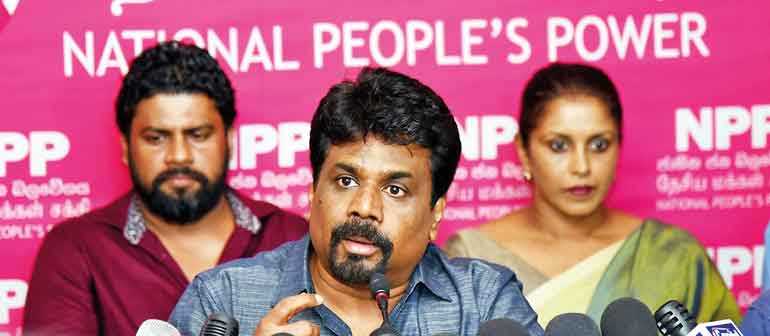Tuesday Feb 24, 2026
Tuesday Feb 24, 2026
Saturday, 8 August 2020 01:30 - - {{hitsCtrl.values.hits}}

NPP Leader Anura Kumara Dissanayaka – Pic by Ruwan Walpola
By Shailendree Wickrama Adittiya
The National People’s Power (NPP) yesterday stated that efforts to build support for the party will continue across the island and that their role in the Opposition will extend beyond Parliament.
Addressing the media, NPP Leader Anura Kumara Dissanayake said the party faced a setback in the results they received at the Parliamentary Elections held on 5 August, especially compared to their performance at the Parliamentary Elections 2015. This was despite there being no significant change in the number of votes received.
“This result is not one we can be satisfied with but we will accept this as the trust the public has in us and the trust they have in elections,” Dissanayake said. He denied, however, that the result was due to a change in symbol or party name.
Despite receiving only three seats at the ninth Parliament, the NPP backs its objectives of democracy, freedom, development, good political culture, and building the economy of the country.
These objectives and policy pave a singular path to building the country, he said, adding that despite the NPP’s message reaching a large portion of the public, their support did not translate into votes at the Parliamentary Elections.
While the NPP will discuss their National List nominee, the party is confident that they can build a power that can bring change to the country, expand the party, and reach more people.
Responding to questions about support shown by the NPP to the United National Party (UNP) and its Leader Ranil Wickremesinghe, Dissanayake said the party has never shown such support, whether directly or indirectly.
However, he added that the decisions and measures taken by the NPP for democracy, the people, and the country may sometimes align with the decisions of one political camp or another.
In terms of an Opposition, the NPP Leader said that the Opposition should not be limited to the Parliament but that their responsibilities and tasks extend to the public. “I am not saying there is no role for the Opposition in Parliament but that there is a role for the Opposition outside the Parliament as well,” Dissanayake added.
He explained that if issues faced by the people are not solved, for instance the agricultural sector or unemployed youth, it was the Opposition’s responsibility to speak up for these people.
Since a two-thirds majority has been secured in Parliament, it was now the Government’s responsibility to deliver on promises made prior to the Presidential Elections 2019.
Dissanayake said that the Government led by President Gotabaya Rajapaksa failed to deliver on promises made prior to the Presidential Elections 2019 due to the fact that they did not have a two thirds majority in Parliament.
“During the nine months since the Government was formed on 16 November, they constantly made the argument that they did not have the majority power to solve issues, whether it was regarding pension reductions, fertiliser deficits, job creation, and even taking fraudsters to task,” Dissanayake said, adding that a two-thirds majority thus became their party slogan, along with the law being applied uniformly across the country.
He went on to say that limitations of power could no longer be used as an excuse, however, due to the fact that they have received the people’s mandate. This applies to promises made of constitutional reform, he said, explaining that despite sparking discussion about a new constitution, the Sri Lanka Podujana Peramuna (SLPP) has failed to reveal details on its contents as well as if it will strengthen democracy, human rights, and freedom of the people.
However, he added: “The new constitution does not depend solely on a two-thirds majority but also the referendum of the people.” Dissanayake explained that the party has always given suggestions for constitutional reform on areas like the need for strengthened democracy, democratic structures, fundamental rights like employment, education, and healthcare, human rights, and stability of the country. These suggestions apply to a new constitution as well as amendments to the current constitution, the NPP Leader added.